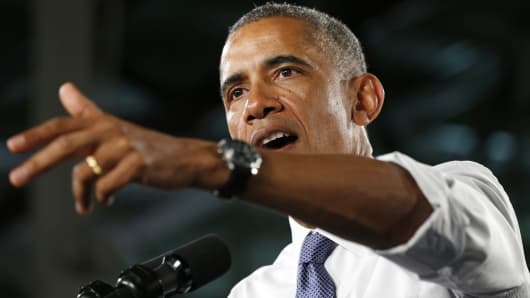President Obama is seeking a new federal law that would mandate that employers provide their workers with up to seven paid days of sick leave annually. There are at least three reasons why the enactment of "Obamaleave" would be a bad idea.
First, a federal paid sick law would complicate administration of mandatory paid sick leave laws in the handful of places that have adopted paid sick leave laws of their own. The provisions of those laws vary. California's law requires employers of any size to provide up to three paid sick days annually to qualifying employees, with the employee allowed to use those sick days for his own illness or to care for the illness of a broad range of relatives. Connecticut's law is limited to employers of 50 or more and allows the employee to use those sick days to care only for herself, her child, or her spouse. Connecticut's law also, however, provides for the equivalent of two more days of sick leave per year than California's law.
Read MoreObamacare year two: more clueless than ever
Where federal and state employment laws differ on the same topic, as in the case of the minimum wage, the more employee-friendly law generally applies. It is unlikely that a federal paid sick law will be written in such a way as to trump, or preempt, all state paid sick leave laws. Sorting out which provisions are more or less employee- friendly than the federal law will be a challenge.
Second, the states that have employer-funded, job-protected paid leave laws have enacted those laws only very recently. The paid sick leave law in Connecticut went into effect in 2012. Massachusetts enacted its law by ballot this past fall. California's paid leave law went into effect this January. According to The New York Times, a member of the president's Council of Economic Advisers has said that "evidence" shows that paid-leave programs help workers without cutting into employer profits. What evidence? The right to accrue paid leave under California's law will not even kick in until July 1. Any "evidence" can only be based on Connecticut's two-years of experience and that of a small number of cities with such laws. Is that really enough to validate the enactment of a nationwide employer mandate?
Read MoreHow to avoid paying Obamacare taxes
The great Supreme Court Justice Louis Brandeis once wrote that a "state may, if its citizens choose, serve as a laboratory; and try novel social and economic experiments without risk to the rest of the country." Why not wait to see what actually comes of these experiments in the laboratories of democracy that have enacted them? The federal Family Medical Leave Act, providing for 12 weeks of unpaid job-protected family leave annually, was not enacted until 1993. That was at least a half dozen years after the first state enacted such a measure. Let's wait.
Three, one of the arguments used to justify this measure is that the United States is one of only a few countries without paid sick leave for employees. So what? The American economy is on the rebound even as the economies of many other developed and developing countries are struggling. The argument that we should adopt workplace policies found abroad is singularly unpersuasive just now.
This is not to say that it is a bad idea for employers to provide paid sick leave. It obviously is better for sick employees to stay home rather than come to work in an impaired capacity and to infect others. It may also be better for employees with sick loved ones to stay home to care for them rather than to work distracted. Offering such a benefit makes a company a more attractive prospective employer.
Read MoreOp-ed: The Great Obamacare-Medicaid Bait 'n' Switch
But whether an employer must pay for sick leave is not cost-free. It matters in a way that may elude statistics. What of that job that is not created because of the expense of the mandate or the cost of replacing the temporarily absent worker? Can any federal subsidy of the kind the president is including in his proposal fully compensate for that?
President Obama's paid sick leave proposal is unlikely to be enacted by a Republican Congress. With all of the talk of the projected dysfunction of divided government, we should not overlook its greatest blessing. Divided government stops either side's worst ideas from becoming law.
Commentary by Dan Eaton, a partner with the San Diego law firm of Seltzer Caplan McMahon Vitek where his practice focuses on defending and advising employers. He also is a professor at the San Diego State University College of Business Administration where he teaches classes in business ethics and employment law. Follow him on Twitter @DanEatonlaw.


